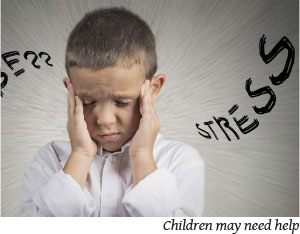As of January 2016, those practicing in the mental health profession are required to be registered with the Ministry of Health. WTM spoke to Lamar Kanafani, the island’s first, and only, licensed marriage and family therapist, about her work and the battle to get the field officially recognised.
With Lebanese, Italian and Brazilian heritage and brought up in Saudi Arabia before studying in Switzerland and the USA, Lamar is very definitely a citizen of the world. But what took her into such a specialised and, potentially, difficult field? She says: “Everyone grows up in a family that has its problems, no family is problem free. My inspiration to become a therapist came from a deep-seeded desire to see people happy… I think, ultimately, that is everyone’s desire.”
After completing her master’s degree from the University of San Diego, California, in 2004, Lamar had already gained extensive training and supervision in the field, and moved to Bahrain to continue her practice. She approached the appropriate ministry in an attempt to solidify her registration, but says recognition of the marriage and family therapy profession as a legitimate practice in the mental health discipline was a long time coming.
“At first I was met with a lot of resistance because it’s a relatively new profession in the Middle East and I think the field was misunderstood, and therefore, displaced as a ‘counselling’ or ‘life-coaching’ service.”
 Lamar explains that marriage and family therapy requires competency in the areas of assessment, diagnosis and a specific treatment plan based on diagnoses. In some cases, collaboration with physicians is necessary to ensure a multi-disciplinary approach to the person’s overall health care. “The mind and body are intricately connected, so it makes no sense to take care of one part and exclude the other. Likewise, the person and the family that person is a part of are also connected in complex ways; so to address a person’s issues while disregarding the very network they are intimately involved in also makes no sense,” she says.
Lamar explains that marriage and family therapy requires competency in the areas of assessment, diagnosis and a specific treatment plan based on diagnoses. In some cases, collaboration with physicians is necessary to ensure a multi-disciplinary approach to the person’s overall health care. “The mind and body are intricately connected, so it makes no sense to take care of one part and exclude the other. Likewise, the person and the family that person is a part of are also connected in complex ways; so to address a person’s issues while disregarding the very network they are intimately involved in also makes no sense,” she says.
“I would like to give credit to Dr Mariam Al-Jalahma, the CEO of Bahrain’s National Health Regulatory Authority for recognising the importance of legitimising the field and requiring practitioners to be licensed, which will mean proper qualifications and proper representation of one’s education and scope-of-practice!”
In fact, until very recently there was no regulation, anyone with minimal or basic certificates could set up as a ‘counsellor’ or ‘therapist,’ and call themselves as such. But marriage and family therapy is a very specific field of practice, requiring a higher-level university degree, extensive hours of supervised practice and a responsibility to stay up-to-date through continuing education. Underqualified people have been over-crediting themselves and over-representing their level of education and training; consequently, overpromising service benefits. Lamar says: “While this is highly unethical, deceptive and unprofessional, it is important to know that this, in fact, can do more harm than good to people seeking help at a desperate and vulnerable time in their lives. This is not something to be taken lightly. If there’s anything that doesn’t lie within my own training and scope-of-practice, I refer to or collaborate with the appropriate specialist or service.”
Some of the most common problems Lamar deals with are depression, anxiety, marital discord, child behavioural concerns, child abuse and infidelity. She also works with teens living with eating disorders and cyber bullying. One of her passions lies in the area of parenting. She holds parenting courses and ongoing support groups throughout the school year.
In terms of marital therapy, she adds: “Couples usually come in to see me very late, when their problems feel like they have spiralled out of control. Which makes fixing the marriage very challenging. So, it is much more effective to come in for help at an earlier stage. And if a marriage seems to be irreconcilable, we work towards ending the relationship with the minimum of damage.
“It has been the understanding that seeing a psychiatrist or psychologist is the only helping avenue available. However, people have alternative options, and family therapy is one of them. Many presenting problems don’t need medication and are best dealt with through therapy and more natural remedies. Working towards change happens when a person gains a clearer understanding of their problem and what’s maintaining it.”
Lamar regularly receives referrals from doctors, teachers and other professionals; and, now that the profession is properly regulated, she will be practising out of Royal Bahrain Hospital.
To contact Lamar, call 36 009-665.


































